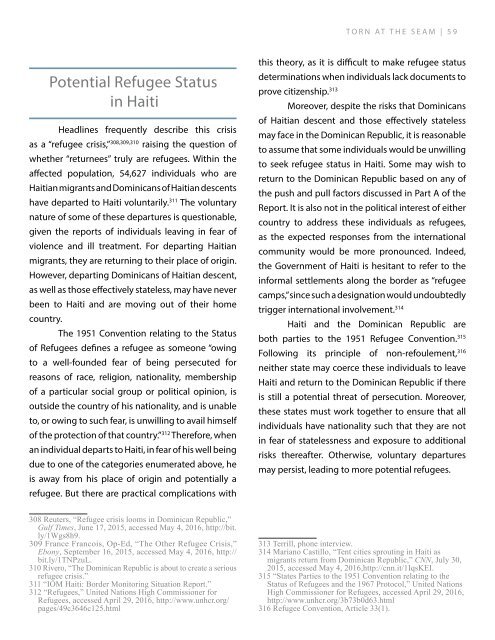Create successful ePaper yourself
Turn your PDF publications into a flip-book with our unique Google optimized e-Paper software.
<strong>TORN</strong> <strong>AT</strong> <strong>THE</strong> <strong>SEAM</strong> | 59<br />
Potential Refugee Status<br />
in Haiti<br />
Headlines frequently describe this crisis<br />
as a “refugee crisis,” 308,309,310 raising the question of<br />
whether “returnees” truly are refugees. Within the<br />
affected population, 54,627 individuals who are<br />
Haitian migrants and Dominicans of Haitian descents<br />
have departed to Haiti voluntarily. 311 The voluntary<br />
nature of some of these departures is questionable,<br />
given the reports of individuals leaving in fear of<br />
violence and ill treatment. For departing Haitian<br />
migrants, they are returning to their place of origin.<br />
However, departing Dominicans of Haitian descent,<br />
as well as those effectively stateless, may have never<br />
been to Haiti and are moving out of their home<br />
country.<br />
The 1951 Convention relating to the Status<br />
of Refugees defines a refugee as someone “owing<br />
to a well-founded fear of being persecuted for<br />
reasons of race, religion, nationality, membership<br />
of a particular social group or political opinion, is<br />
outside the country of his nationality, and is unable<br />
to, or owing to such fear, is unwilling to avail himself<br />
of the protection of that country.” 312 Therefore, when<br />
an individual departs to Haiti, in fear of his well being<br />
due to one of the categories enumerated above, he<br />
is away from his place of origin and potentially a<br />
refugee. But there are practical complications with<br />
this theory, as it is difficult to make refugee status<br />
determinations when individuals lack documents to<br />
prove citizenship. 313<br />
Moreover, despite the risks that Dominicans<br />
of Haitian descent and those effectively stateless<br />
may face in the Dominican Republic, it is reasonable<br />
to assume that some individuals would be unwilling<br />
to seek refugee status in Haiti. Some may wish to<br />
return to the Dominican Republic based on any of<br />
the push and pull factors discussed in Part A of the<br />
Report. It is also not in the political interest of either<br />
country to address these individuals as refugees,<br />
as the expected responses from the international<br />
community would be more pronounced. Indeed,<br />
the Government of Haiti is hesitant to refer to the<br />
informal settlements along the border as “refugee<br />
camps,” since such a designation would undoubtedly<br />
trigger international involvement. 314<br />
Haiti and the Dominican Republic are<br />
both parties to the 1951 Refugee Convention. 315<br />
Following its principle of non-refoulement, 316<br />
neither state may coerce these individuals to leave<br />
Haiti and return to the Dominican Republic if there<br />
is still a potential threat of persecution. Moreover,<br />
these states must work together to ensure that all<br />
individuals have nationality such that they are not<br />
in fear of statelessness and exposure to additional<br />
risks thereafter. Otherwise, voluntary departures<br />
may persist, leading to more potential refugees.<br />
308 Reuters, “Refugee crisis looms in Dominican Republic,”<br />
Gulf Times, June 17, 2015, accessed May 4, 2016, http://bit.<br />
ly/1Wgs8h9.<br />
309 France Francois, Op-Ed, “The Other Refugee Crisis,”<br />
Ebony, September 16, 2015, accessed May 4, 2016, http://<br />
bit.ly/1TNPzuL.<br />
310 Rivero, “The Dominican Republic is about to create a serious<br />
refugee crisis.”<br />
311 “IOM Haiti: Border Monitoring Situation Report.”<br />
312 “Refugees,” United Nations High Commissioner for<br />
Refugees, accessed April 29, 2016, http://www.unhcr.org/<br />
pages/49c3646c125.html<br />
313 Terrill, phone interview.<br />
314 Mariano Castillo, “Tent cities sprouting in Haiti as<br />
migrants return from Dominican Republic,” CNN, July 30,<br />
2015, accessed May 4, 2016,http://cnn.it/1IqsKEI.<br />
315 “States Parties to the 1951 Convention relating to the<br />
Status of Refugees and the 1967 Protocol,” United Nations<br />
High Commissioner for Refugees, accessed April 29, 2016,<br />
http://www.unhcr.org/3b73b0d63.html<br />
316 Refugee Convention, Article 33(1).


